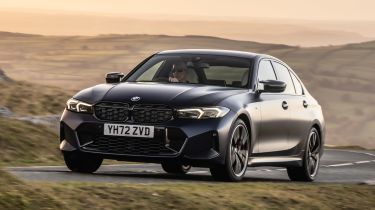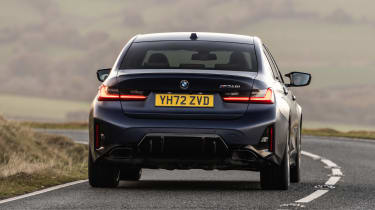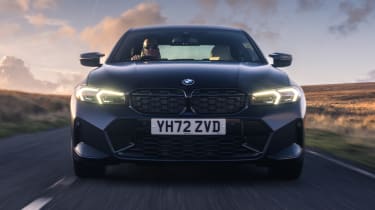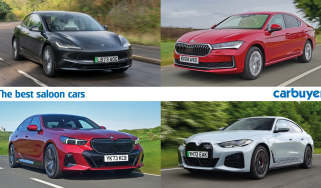BMW 3 Series review – Engines, drive & performance
Agile, comfortable and quick, only its lifeless steering spoils the 3 Series as a driver's car
The latest BMW 3 Series sticks to the time-honoured layout of front engine and rear-wheel drive, which has underpinned the model since the early 1970s. However, progress has brought subtle changes over the years, and each incremental change has mounted up to make today's car thoroughly state of the art.
The M340i and M3 are available with BMW’s xDrive four-wheel drive transmission for extra traction and acceleration, but the rest of the range is rear-wheel drive.
A clever suspension design is also among the list of improvements made to the 3 Series for the seventh generation. Described as ‘stroke dependent’, it provides softer damping when the car is lightly loaded, becoming firmer as the car's weight increases. It’s certainly an effective set-up, and even on poorly maintained UK roads the suspension maintains a supple ride without upsetting the BMW's composure in corners.
Better still, this new-found comfort isn’t at the expense of the BMW’s sporting nature. The Sport trim offers a great compromise between ride and handling, while M Sport cars are firmer for added cornering prowess, without crashing into most bumps.
Although the ride is firm on the worst British roads, the 3 Series is far from uncomfortable. Bumps are rounded off nicely, leaving passengers exposed only to mild jolts, rather than the severe shocks that once plagued sporty saloons. Road surface imperfections tend to be betrayed in a little more detail, though, when the larger 18-inch alloy wheels are fitted – you get a sense of bumps and ripples in the road surface more easily. Buyers wanting greater comfort should consider the optional adaptive dampers, which can be adjusted to soften or stiffen the ride to taste.
More reviews
The upshot of the bigger wheels and wider tyres is an even more grippy, responsive car. With the rear wheels further apart than the front (a measurement known as a car's 'track'), the 3 Series feels very assured and stable, which leads to a real sense of confidence when you head into a corner. The only thing that detracts from the BMW as a genuinely rewarding car is the steering, which has the slightly remote, uninvolving feel from which fuel-efficient electric power steering systems often suffer. It’s also quick to respond, which feels great on a twisty B-road, but can make the M Sport version feel slightly twitchy on the motorway.
Honed by BMW's M division, the BMW M340i xDrive is the hottest version of the 3 Series in the regular range, sitting beneath the BMW M3. In this niche of mid-level performance saloons it goes head-to-head with the Mercedes-AMG C 43 and the Audi S4, offering enthusiasts a great chassis and rapid acceleration. It arguably doesn't feel quite as special as its Mercedes rival, but there's no denying its ability to cover ground at an astonishing pace. It has excellent body control and direct steering, and while it’s certainly agile, adaptive suspension means it can also be as comfortable as regular versions.
Petrol engines
The petrol 318i was previously the cheapest 3 Series available, but it was discontinued for the 2022 facelift as BMW slimmed down the lineup. With 154bhp, it also had the lowest power output of the range but was still pretty capable, with 0-62mph taking only 8.4 seconds.
The rear-wheel-drive 320i now forms the entry point, with 181bhp and 0-62mph completed in a reasonably swift 7.4 seconds. It’s also good to drive, with poised and well-balanced handling that’s reminiscent of the BMWs of yesteryear, with a slick eight-speed automatic gearbox making it a strong all-rounder.
We expect the 320i will be plenty for many petrol fans, and BMW thinks so, too, as the 330i, which was a tuned 245bhp version of the same turbocharged four-cylinder was discontinued. Above it now sits the first of the sportier M-badged cars, the M340i, which gets a turbocharged 3.0-litre six-cylinder engine with a hefty 369bhp propelling it from 0-62mph in 4.4 seconds.
Of course, the lineup doesn’t stop there, because above the M340i is BMW’s flagship M3 with even more power. This performance-focused model gets a whopping 523bhp from its twin-turbocharged 3.0-litre six-cylinder engine and as a result, it can dispatch the 0-62mph sprint in just 3.5 seconds, making it one of the fastest saloon cars you can buy. That’s probably overkill for most buyers, though – we think the M340i’s still-impressive performance figures are satisfying enough for those after a little more oomph than the norm, and yet it costs almost £26,000 less.
In essence, the example we tested felt like a shrunken BMW M5 super saloon. The four-wheel-drive system is unobtrusive, so the M340i xDrive feels more like a very obedient rear-wheel-drive car most of the time. It makes the right noises, though, with characteristic pops and bangs from the exhaust when you lift off the accelerator. Change into Eco mode and it also settles down and becomes civilised enough to shrug off a congested commute with ease.
Hybrid engine
The latest version of the BMW 3 Series comes with a plug-in hybrid variant, badged the 330e, which pairs an electric motor with the 2.0-litre petrol engine. These combine for a total power output of 288bhp, propelling the 3 Series from 0-62mph in 5.8 seconds.
The BMW 330e still feels surprisingly good to drive despite the extra weight to its batteries, although it’s still not quite a match for one of the pure petrol models. Still, given it’s the company-car of choice from the range, there’s still lots of enjoyment to have, and the driver can choose between different drive modes, including Hybrid which gives a good everyday balance, EV mode for silent zero-emissions running around town, or Sport, which combines the motor and engine for maximum performance.
As a general rule, while many PHEVs can sound very unrefined and noisy once the combustion engine kicks in, the BMW 330e keeps its engine revs at a sensible range, especially at a cruise.
BMW 3 Series diesel engines
As of mid-2024, BMW has discontinued its diesel-powered 3 Series, but they still might make sense as a used buy for drivers covering lots of motorway miles.
The 320d badge is a familiar one because it’s on the rear of so many 3 Series models sold. The rear-wheel-drive model also gets the same mild-hybrid assistance used in the now-discontinued 318d. This consists of a 48-volt starter generator and a small battery that’s charged using the energy normally lost under coasting and braking, providing a boost of up to 11bhp. With a 187bhp power output and low running costs, it was a popular choice in the past.
In true diesel style, its performance is better described as effortless than exhilarating, but 0-62mph in 6.8 seconds is pretty quick, and a 149mph top speed ensures relaxed high-speed cruising. Thanks to its advanced turbocharging, it very rarely feels out of breath either. It proves quiet when a constant speed is maintained, and – while it gets a little loud at full throttle – it's less noisy generally than the previous model.
The eight-speed automatic gearbox changes through the gears almost imperceptibly, and manual gear changes are just as prompt and smooth when you take manual control via the steering wheel paddles. However, the gearbox is so well calibrated that you might as well just leave it in full automatic mode and save yourself the effort.
 Top 10 fastest diesel cars 2025
Top 10 fastest diesel cars 2025
The M340d xDrive takes just 4.6 seconds to hit 62mph, which made it one of the fastest diesel cars on sale at the time. If you need a fast executive car to cross continents in, there’s a lot to be said for a straight-six diesel that can make motorway speeds appear effortless.













